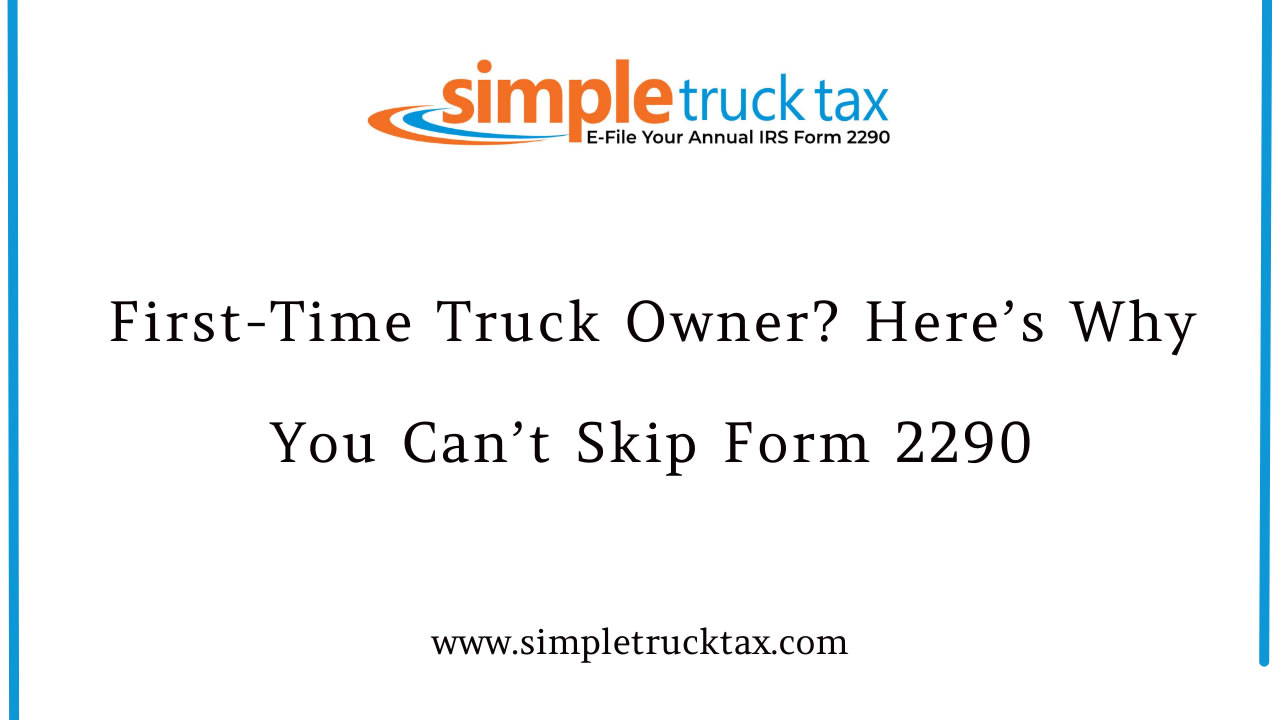
First-Time Truck Owner? Here’s Why You Can’t Skip Form 2290
Upgrading your vehicle to a heavy-duty truck? That calls for a celebration. For owner-operators, or those looking to expand their existing business, there is one item on your checklist that will Form 2290.
This is a prerequisite for registering your truck, which means you could face a number of penalties including time loss, additional fees, or issues registering the truck.
There is a good reason why this form is critical for new truck owners, and we’ll explain it below.
What Is Form 2290?
Form 2290 refers to 'Heavy Highway Vehicle Use Tax Return'. This is an IRS form that applies to trucks with a weight of 55,000 pounds or more (and yes, they do need to be functioning on public highways). This document determines the total amount of the tax a truck owner has to pay annually in terms of Heavy Vehicle Use Tax (HVUT).
If you are driving big rigs, chances are you are liable for taxes. The funds collected are used to maintain and improve highways across the US—this means you are contributing towards ensuring the roads are maintained not just for yourself but for everyone else too.
Who is Required to Submit Form 2290?
Filing Form 2290 is a requirement if you possess a heavy vehicle for business, agriculture, or logging purposes, and the vehicle surpasses a weight of 55,000 pounds. This encompasses:
- Owner-operators
- Trucking companies
- Agricultural haulers
- Owners of logging vehicles
Somebody is still liable to file even if they drive the truck part time or lease it out, as long as it's above the weight limit and is driven on public roads.
Filing Deadline for Form 2290
You cannot get timing wrong. The HVUT tax year is from July 1 to June 30 of the subsequent year. Filing becomes a necessity if you put your truck on the road during this period it becomes a necessity to file by the last day of the upcoming month.
Say for instance you put your vehicle on the road in April, your deadline to submit Form 2290 will be May 31. This tends to be missed by new owners resulting in automatic late penalties which is the last thing you would want.
Why Without Registering is Not an Option
In most state DMVs, a proof of tax payment - a Stamped Schedule 1 - is obligatory to register the vehicle or even renew the license plate. In the absence of this documentation, the vehicle would be immobilized until the tax in question is submitted.
Avoid letting paperwork slow down your operations. Filing Form 2290 on time ensures your business stays operational.
What If I Don’t Complete It?
Not filing 2290 means more than taxes owed, including:
- Offenses and tax penalties through the IRS
- Hindered vehicle registration
- Audit exposure for non-compliant filings
- Increase in additional late submission penalties Furthering these stresses is as difficult as neglecting tax obligations.
Form 2290 can be completed by means of posting the document or electronically filing it (e-filing). For instant access to your Stamped Schedule 1, Schedule I recommend e-filing, especially when time constrained.
Documents Required:
- An EIN (Employer Identification Number) not associated with your SSN
- Vehicle Identification Number (VIN)
- Your trucks registered gross weight
- The date of the trucks public replay of first use highway
Once you file, you’re required to keep your stamped schedule 1 as proof of tax payment, submitting the document at the DMV is a must.
Do Not Quit Complying, Keep The Truck Moving
New truck owners might not consider filing Form 2290 to be very exciting, but it undeniably is a very crucial aspect of their business. It safeguards the business, makes sure that the truck is legally operational, and affirms that there are no issues with the IRS and the DMV.